
By John, Certified Holistic Health Coach
After the headlines about the water woes of Flint, Michigan, many of us were reminded of how lucky we are to be able to filter our water so that we can stop contaminants before they get to us.
Should You Worry About YOUR Water?
Of course, lead-contaminated water is not a problem limited to Flint. The fact is, there are many cities and towns with lead pipes. If you are on a municipal water system anywhere in America, you stand a good chance of having pipes just like Flint’s somewhere in the system.
Besides that, almost all water in our homes/businesses flows through pipes that potentially leach other harmful chemicals. Add to that the various toxins found/added to most municipal water systems, and you realize there are very good reasons to filter your tap water.
How to Choose the Best Water Filter
Obviously, we’d all like to enjoy the best water quality possible, but the world of water-filter technology is confusing to navigate. Our readers often ask: How can I quickly learn what filter is best for my family’s needs? How can I be sure the filter I bought is doing what it claims to be doing?
I’ve been researching (and testing!) various types of water filters for decades now, so I’ll try to provide you with my understanding of this issue, and help you choose the best water filter for your family.
Types of Water Filters
The most widely available and effective water filters are as follows:
- Carbon/activated carbon filters: Activated carbon chemically bonds with and removes some contaminants in water that is filtered through it. Some carbon filters just remove chlorine and improve taste and odor, while others remove a wide range of contaminants including lead, asbestos, mercury, and volatile organic compounds (VOCs). Activated carbon cannot effectively remove common “inorganic” pollutants like fluoride, arsenic, nitrate, hexavalent chromium, and perchlorate.
There are two types of carbon filters:
a. Granulated activated carbon (GAC) filters: These filters contain fine grains of activated carbon. Typically, they are less effective than carbon block filters (see below) because they have a smaller surface area of activated carbon.
b. Carbon block filters: Carbon block filters are made from pulverized activated carbon that is compressed into blocks. They are typically more effective than granulated activated carbon filters because they have more surface area. - Ceramic filters: These do not remove chemical contaminants, but they have very small holes throughout the material that block solid contaminants such as cysts and sediments.
- Kinetic degradation fluxion (KDF) filters: KDF is a combination of copper and zinc. It creates an electro-chemical reaction. During this reaction, electrons are transferred between molecules, and new elements are created. Some harmful contaminants are changed into harmless components. Some heavy metals–such as copper, lead, mercury and others–react to plate out onto the medium’s surface, thus being effectively removed from the water supply.
- Distillation: Water is distilled by boiling it and capturing the steam. The steam cools back into water. Many substances are left behind and the resulting water is purer. Unfortunately, most of the dissolved beneficial minerals are absent in distilled water. Also, many feel that distilled water is considerably more caustic and will rob minerals from our bodies. Although this topic is robustly debated, we feel that this technology is not a good solution for filtering water when there are so many better, and less expensive, solutions.
- Mechanical filters: These filters have tiny holes that remove contaminants such as cysts and sediments. They cannot remove chemical contaminants. They filter essentially the same things that ceramic filters do.
- Reverse osmosis filters: This process pushes water through a semi-permeable membrane that blocks particles larger than water molecules. Reverse osmosis can remove many contaminants not removed by activated carbon, including arsenic, fluoride, hexavalent chromium, nitrates, and perchlorate. However, reverse osmosis does not remove chlorine, trihalomethanes, or volatile organic chemicals (VOCs). Many reverse osmosis systems include an activated carbon component than can remove these other contaminants. Quality can vary tremendously in both the membrane system and the carbon filter typically used with it. Consumers should also be aware that reverse osmosis filters use 3-to-20 times more water than they produce. They waste quite a bit of water. One exception is this RO filter.
There are other types of water filtration methods out there, but the above technologies are usually the simplest and most cost effective ways improve the water quality in your home.
We hope you’re enjoying this post! Sign up for our newsletter to be alerted when we publish or update our Safe Product Guides.
Does Your Water Filter Work?
So how can we know if a particular filter manufacturer is producing effective water filters?
There are independent testing agencies that test contaminated water after it has passed through a test filter. If the filter removes all, or nearly all of the specified contaminants, it qualifies for certification. One of the best certifications is the NSF 53 Protocol. Filters that show positive results are granted certification and can be trusted, in my opinion.
What About Fluoride?
There is a significant debate about the ramifications of the use of fluoride in water. There seems to be science that lends validity to both sides of the discussion, but recent studies do suggest that fluoride may be harmful. We choose to filter the fluoride from our water, but we understand that others might take a different view, which is why we offer two options for filters.
What is the Best Water Filter?
You may have noticed that I did not talk about gravity filters like Brita in this post. Generally speaking, these types of filters reduce select chemicals and metals, but they mostly improve the appearance and taste of the water. We feel that to truly filter water, it is necessary to step up another level or two.
Most households need nothing more than a two-filter or three-filter system in order to have great, healthy water. We have found a small manufacturer to build us water filter systems that are simple, affordable, and effective. They’ve been making filters since 1989, and each system has options for either countertop or under-counter installation. These systems are NSW Protocol 53 Certified.
- The two-stage filter – Available for countertop or under-counter installation, this water filter uses KDF,granulated activated charcoal, and carbon block filters to effectively eliminate a wide variety of common contaminants, including chlorine, chloramines, heavy metals (including lead, chromium 6, mercury), iron, aluminum, hydrogen sulfide, chemicals, DBPs (disinfection by-products), THMs (trihalomethanes), HAAs (haloacetic acids), MTBE, VOCs, many pharmaceutical products, and more. This filter does NOT remove fluoride. If you want to filter fluoride from your water, you will want the three-stage filter instead.

- The premium three-stage filter – Available for countertop or under-counter installation, our three-stage filter system is designed for municipal water that contains a high level of chloramines (chlorine combined with ammonia) and/or VOCs (volatile organic chemicals), PPCPs (pharmaceuticals, personal care products). This triple cartridge water filter includes our fluoride-removal cartridge PLUS our KDF/GAC cartridge PLUS a high performance 0.5 micron extruded multi-media carbon block cartridge.
(Each of the above filters can be easily installed in about an hour or less and require no special tools or skills beyond those found in a typical household.)
- If you can’t drill a hole in your countertop, or if you just want a reverse osmosis water filter, then the ZIP is the best one we’ve found.
The Best Water Filter for Your Bathroom
Finally, it should be noted that chlorine (found in most water supplies) is as easily absorbed through our skin as it is through our stomach. For that reason, we also use a shower filter and a bathtub filter in our home.
Stay sane,
P.S. For the next three months, for every filter we sell, we are donating $10 to the Flint Water Fund, a nonprofit that is supplying the residents of Flint with safe water.
If you liked this post, sign up for our newsletter to be alerted when we publish new content like this!

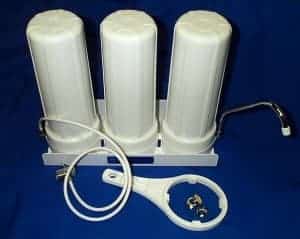
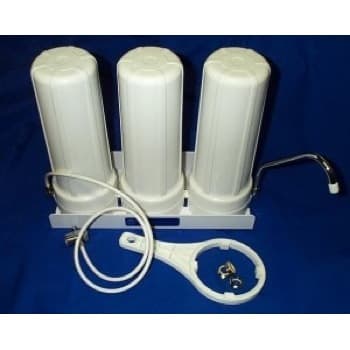

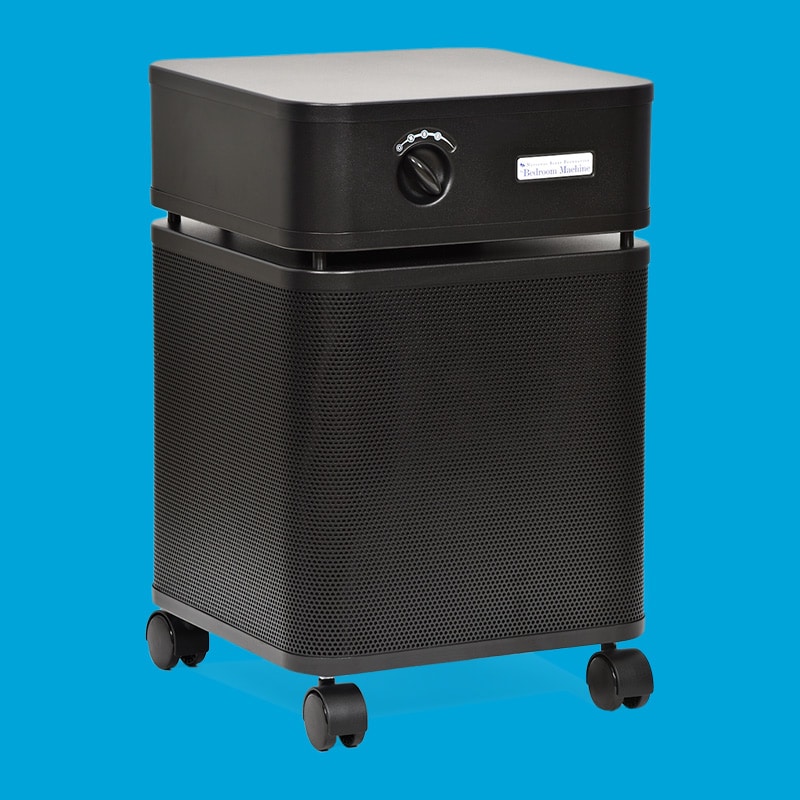

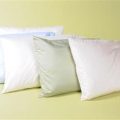

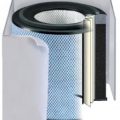

Robs says
Hello John,
I wish I would have known of this site and knew you sold filtering systems before we purchased ours. We’ve had it for almost a year now and after reading this I’m beginning to wonder if we made the right choice , please help! We have the aquasana OPTIMH2O™ REVERSE OSMOSIS + CLARYUM®. Your thoughts on this? Thank you so much in advance !!
Emily says
Do these filters significantly slow down the water pressure?
Maia James says
Hi Emily,
We get this question a lot. The short answer is no, these filters do not reduce water pressure. They will not effect the overall water pressure in a home any more than opening any faucet to the same flow might do.
Thanks for the question!
Graciela Chirinos says
Where can we buy the three stages filter, what is the price of this devise, how often the cartridges need to be changed and what is the cost of the replacements. Thank you
Maia James says
Hi Graciela,
Here is where you can find the filter systems and prices…replacement filters run between $25 and $45 each.
You can purchase our 3 Stage Under-counter filter here: https://gimmethegoodstuff.org/store/under-counter-three-stage-water-filter/
You can purchase our 3 Stage Countertop filter here: https://gimmethegoodstuff.org/store/countertop-three-stage-water-filter/
You can purchase the shower filter here: https://gimmethegoodstuff.org/store/shower-filter/
You can purchase our bath ball filter here: https://gimmethegoodstuff.org/?s=bath+ball
The filter cartridges in two of the three-stage should be changed every two to three years, depending on how much water you use. The fluoride filter is best to change annually.
We can supply you with the filter cartridges as you need them.
Let me know if you need any help placing an order.
Patricia Anderson says
That is cool that these water filtration systems are kind of like how our cells filter water in and out. I mean the names of the water filtration methods are even the same. I want to see what a semi-permeable membrane looks like in a filter. Out of all of these methods which one do you think is the most effective as a water filtration system?
John Goss says
Hi Patricia,
John from Gimme the Good Stuff here…
If by “effective” you mean: the most filtration for the least cost, then I suggest our 3 stage filter. This is what we all use in our homes.
It is available in both countertop and undercounter configurations and does a great job filtering a huge swath of the most common biological and chemical impurities/toxins while leaving the beneficial minerals intact.
They install easily, are reasonably priced, and filter a lot of water before the need to replace filter cartridges… which are also reasonably priced and easy to replace.
Feel free to contact me directly at john@gimmethegoodstuff.org.
I’m happy to offer further guidance.
Carolyn Clarke says
Thank you for the great information. We are renting a home in the DC area and the water here is very hard. Installing a water softener is not an option. Our baby has eczema and the more I bathe her, the worse her rash gets. All of us have very dry skin as well. Will the shower filter remove the minerals that are irritating and drying our skin?
Thank you!
Carolyn
Laurie says
I wasn’t aware that reverse osmosis was a big water waster – that is a big downside for sure. Great information on different filtration methods, thanks for sharing!
Deborah says
I’m trying to understand the difference between your three stage water filter and the water filter I currently have which is a single filter that incorporates five stages in one housing. Its spec sheet claims this:
“The system conforms to NSF/ANSI 42 and 53 for specific performance claims as verified and substantiated by test data.”
John Goss says
Hi Deborah,
John here…
Without knowing the exact filter you are using, the short answer is that a single 5 stage filter must try to “clean” the water with smaller amounts of each filter medium. This means that the water is exposed to each filtering medium for less time.
Depending on the medium, this may or may not effect the percentages of “pollutants” that are filtered.
With larger, dedicated filters, the effectiveness can increase and the filter cartridges ca last much longer.
Theodora says
Hi John,
When the time comes for me to change the fluoride filter do we just email you since this is not on your product shopping list or do you plan to add these items per Graciela’s above comment?
Thank you,
Theodora
Hannah says
For living in this world, there is no alternative of water for the body to save a life. Water is a must to run the body. Water aids to run the body properly and helps to do all the functions well. Water is very essential for the cleansing system. Now the medical association has found that the body needs water to maintain the normal function of the body. Our body is made of mostly 70% of water. If we analyze the amount of water in our body we find that in blood the amount is 80%, in the brain, this is 75% and our main filter named liver is 96% water. You badly need to choose the best reverse osmosis system to fulfill the requirement of lives. Further more visit here- http://www.ewaterpurifier.com/buying-guide-best-reverse-osmosis-system-2016/
Larry Adkins says
Thanks for your nice explanation.
Very Helpful Post, Thanks for Sharing 🙂
Jodie says
I am wondering if there is a whole house filtration system that you would recommend? Otherwise I’m thinking of getting a whole house reverse osmosis and then adding the filters you sell here like the bath ball etc to make sure I get all of the contaminants out, what would you recommend? Thank you so much:)
Kary says
Do you have the performance data sheets for the water filters you carry available?
John Goss says
Hi Kary,
John here…
You and I have discussed this via email, but it is such a good question in light of new data about Chromium VI, that I hope you don’t mind if I address it in an open forum. We love sharing good questions…
For the rest of you….Kary emailed me today with good questions about our water filter technology. She had spotted the startling news regarding Chromium VI being found in many US water supplies. (Chromium VI is the chemical culprit in the film “Erin Brockovich”).
I’ll admit to thinking that since Ms Brockovich successfully sued the folks who were dumping this toxin, and since it was so widely publicized, that it was no longer of concern to most of us. Boy was I wrong!
This is from the CNN website…
“But this new analysis from the Environmental Working Group, an independent advocacy group, examines evidence from water systems throughout the nation and concludes that the tap water of 218 million Americans contains levels of chromium-6 that the group considers dangerous.”
That got my attention and it got Kary’s attention too! Several months ago Kary had purchase one of our water filtration systems for her home, and today she contacted me wondering how well her new filter system did against Chromium VI.
Happily I was able to show her an independent lab report showing that our KDF/GAC filter reduces Chromium VI by 93%. This means that if water going into the filter has 3 times the EPA allowed amount of Chromium VI, the water coming out of the filter system will have just 0.01 PPM (Parts per million).
So what does that mean? California is proposing what will arguably be the world’s most stringent regulation of Chromium VI in water. The level they are proposing is 0.02PPM. This is less than one half of what the EPA now allows. Thank you California!
So I think that Kary and I can both breathe a bit easier knowing that our filter systems result in only 1/2 of the very strict California allowable levels of Chromium VI. .01 is half of .02
Thanks Kary for your concern…good on you!
If, like Kary, you are concerned about the quality of the water you drink and bathe in, you can go to our site to see our water filter systems.
https://gimmethegoodstuff.org/?s=water+filter
Also, please feel free to contact me directly if you have specific questions.
Best
john@gimmethegoodstuff.org
Lauren says
I am not very familiar with the NSF certification, so I just have a quick question! Above it states the filters are NSW protocol 53 certified in the section “So what filter should you buy” paragraph 2. Other places you say NSF protocol 53 certified. Is the “W” in NSW just a typing error? Like I said I haven’t done any of my own research on this yet, so I wanted to ask if it was a different thing!
Are your shower filters NSF 53 protocol certified as well? Are the filter replacements for the shower filter the KDF ones available on your website under the other filter replacements, or are those KDF replacements for the kitchen filters? If not, where would I purchase a replacement for the shower filter when needed, or do you replace the whole thing?
Thank you!
John Goss says
Hi Lauren,
Oooops! Yes, there is a typo! Thanks for catching it. It should read “NSF”.
The shower filters are not tested to NSF 53 protocol because they are essentially there to catch chlorine, for which they are tested at another facility and at which they do quite well.
Along the way they do filter lots of other things from the water, but because they are filtering hot water rather than cold, all sorts of things change. Most water filters are not meant to filter hot water. It is, however, important to filter shower/bath water because when chlorine in water is heated it becomes a gas and as we shower we can breathe in quite a bit of chlorine in gas form…NOT GOOD!
We can replace any of the filters for any of the units we sell. I believe they are on our website, but I’ll double check.
Best,
John
Thanks for the questions.
Caiti says
Hi there-
I just found out we have lead in our water and need to find a filter for our private well system. I don’t think the filters you carry are for private wells. Can you tell me the name of the manufacturer? Thank you!
john Goss says
We have filters for private wells that absolutely filter for lead and many other chemical and biological contaminates.
Feel free to contact me directly at john@gimmethegoodstuff.org and I can walk you through the process.
Best,
John
Jane says
Hi John! This is a very helpful tips on choosing what water filter to buy. That “Types of Water Filters” part is really informative. Thank you for this knowledgeable post.
Carolyn says
We live in Phoenix, AZ and have the worst drinking water in the. nation due to very high levels of chromium-6. I may have missed it on your website, but I can’t see which filter system you recommend for this. Is reverse-osmosis the only thing that will filter out the chromium? I hate the idea of wasting so much water here in the desert with an RO system. Maybe buying drinking water is our only option? Thanks!
John says
Thanks for the questions re: Chromium 6 in your water.
The short answer is that you do not need a reverse osmosis filter to remove Chromium 6 , and a very wide swath of other harmful chemistry and biologicals from your water.
Our two-stage and 3-stage filter systems do a very good job.
NSW 53 test results show a huge reduction in Chromium VI.
These tests are started only after the filter has already had 20,000 gallons of water run through it! They only fail after over 28,000 gallons had been run through them! That is very very good.
Filter cartridges always perform best at first, but over long periods of time (years) they begin to be less effective. We recommend that you change filter cartridges every 5000 gallons (about 1-2 years).
This means that the test results are for a filter that should have been retired about 5 times!
These filters are VERY effective.
I would not depend on bottled water to supply me and my family with drinking/cooking water. Bottled water is often just tap water from a nearby municipal system…even when the term “Spring Water” is used. It is every bit as likely to contain unacceptable levels of Chromium VI as your tap water.
Our filter systems can be found here…
https://gimmethegoodstuff.org/?s=water+filter
Scroll down to see the options.
Frank Delaware says
My wife and I have been thinking about getting a water system installed in our house, but we weren’t sure how to choose the right one. I love that you say to go for a 2 stage filter because they actually get rid of different types of minerals! It would be nice to know that you aren’t going to drink minerals that could potentially make you sick.
James says
Hi John and Maia,
Really appreciate the time and effort you guys have put into your blog. it’s a treasure trove of information. Regard the water filters, I wondered whether a whole house filter would be as effective. If so, can you recommend a brand/line. Thank you!
James
Daniella says
Can you recommend a whole house filter?
Thanks!
Larry Weaver says
I appreciate how you clarified that carbon filters can remove lead, asbestos, mercury, and VOCs. My mom moved to a new location and she would like to look into water lead removal. Perhaps a carbon filter would be a good place to start looking for options.
Heather says
With the wide variety of water filters available, you need to be sure that your filter is making the cut. Otherwise, you could easily fall ill or see some other detrimental effects.
Bob says
Which filtering system would best remove haloacetic acids?
Emily says
Hi! Thanks for all the info. If I did want to invest in a whole-house filter, can you recommend one?
Thanks!
Poppy says
Like several others, we are building a house, and I am hoping a whole house system can be effective to ease the process of filtering everything! Any thoughts would be very helpful! Also, I was researching faucets for the same reason, and got onto the topic that some faucets can leach lead, even though they are certified due to the “easy” water that they use in the process. I am definitely down a rabbit hole there, but do you know anything about that topic? Does filtering the water help reduce any leeching? I started to get that feeling of I can never win, if I filter the water, only to have it come through the tap and pick up lead! Any thoughts are most helpful – I do know there were some changes in regulations that were supposed to help with this with the composition of the metal and perhaps the manufacturing technique reducing the potential for lead. Finally, on another tangent, I found that there are many certifications faucet manufacturers need to get, and some have only the basics, where others have all of them …. did you look into any of this when you were doing your Lancaster house remodel and have any potential tips? Thanks for your site! I knew Maia when we were in NYC! Miss it there very much!
John Goss says
Hi Poppy,
John here…
We can help you with the “rabbit hole” problem. 🙂
A whole house air filter (and water filter) system can make a big difference. I can help you with that stuff. Because it’s a big subject it might be best to get into that stuff directly via email. john@gimmethegoodstuff.org
PS I can also help you with the faucets.
Daria says
Nowadays probably everyone knows how important it is to drink water. But of course, the water that you consume and use daily should be filtered and harmless for your health.
It is not the easiest tasks especially when you live in a megapolis where the sanitary standards of water are relatively lower.
6 Types of modern water filters https://cookingtopgear.com/types-of-modern-water-filters/
Adrienne Butler says
I am looking to get distilled water from my kitchen faucet for a humidifier
johnlockegoss says
You cannot get distilled water from a faucet. Distilled water is essentially water caught from steam. You can either purchase a distiller or you can buy distilled water at most supermarkets.
As an aside…I do not recommend that anybody ever make a habit of drinking distilled water. While it is very pure, it is not good for human consumption.
Margaret Virginia Suazo says
We have the Kangen Leveluk K8 machine (https://www.enagic.com/?c=product-k8). It’s getting old and looking to replace it… any thoughts on this Kangen machine? We like it because it’s changes the pH so we’re drinking pH 9.5 water. If not recommended, what would a good replacement?
Thanks in advance!
Margaret Virginia Suazo
David Henry says
Hi there!
I’ve just moved to the new house and the water there is so bad that it turns tubs and clothes orange due to buildup over time. Could you recommend a filter that can improve this bad situation? Thanks in advance!
johnlockegoss says
Hi David, Sorry for your water problems. Have you had it tested for Hard Water?
David Henry says
Yes I did. I’ve bought Berkey water filter after reading a lot of reviews about this and it seems that filter works great. My water becomes cleaner and tastes better.
Marin Rankin says
What is your take on refrigerators that have their own water filters?
Chris says
Hello there!
I just moved into a new house, and the water is so terrible that it colours tubs and clothing orange over time due to accumulation. Could you suggest a filter that would help to fix this poor situation? Thank you ahead of time!
Meghan says
Do these filters have to be replaced or have parts that need to be replaced? And if so how often?
malou says
What about minerals in filtered water?
Do you add some after filtration? (especially magnesium and calcium)
Jessie says
I also have a question about minerals. I live in Phoenix, and we have hard water, which I don’t mind for drinking. Do the 2 and 3-stage filters remove all minerals?
Sandra Gomez says
Hi,
Can you recommend a water filter system for the entire house?
Thank you